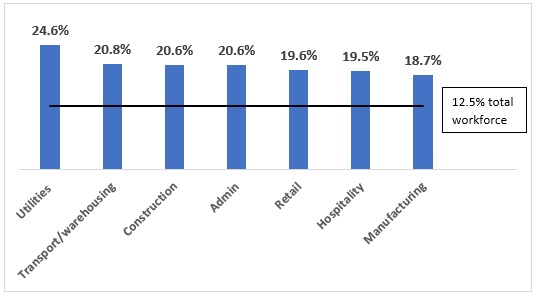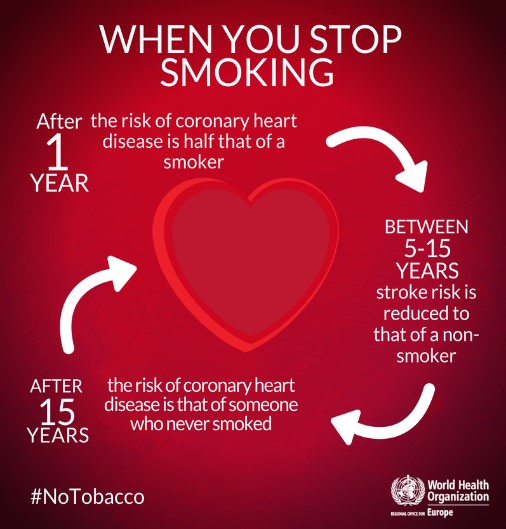
Tobacco
- Around 12% of Australians are daily smokers, a decrease from approximately 30% in the 1980s. The highest proportion of current daily smokers are aged 25-39 (14.5%) and 40-59 (15.6%).
- Smoking kills approximately 20,000 Australians each year and is the leading cause of preventable death and disability including at least 46 medical conditions e.g., stroke, heart disease, at least 16 types of cancer including lung cancer, and type 2 diabetes.
- Long-term smokers die an average of 10 years earlier than non-smokers.
Tobacco and Workplace
Tobacco-related absenteeism and presenteeism costs Australian workplaces $4.98 billion per year due to smokers (including ex-smokers) taking an extra 11.3 million days off work. Workers who smoke daily have an extra 3.7 days off work per year than workers who have never smoked.
Workplace tobacco-related costs include:
- Premature deaths
- Absence from work due to tobacco-related morbidity and injury
- Reduced productivity while at work (also known as presenteeism).
Current smokers (i.e., daily and occasional smokers) are at increased risk of workplace absenteeism compared to non-smokers.
Tobacco-related workplace costs are not evenly distributed across Australian workplaces. The prevalence of daily smoking is significantly higher among workers in utilities, transport and warehousing, construction, administration, retail, hospitality, and manufacturing industries (see Figure 1).
Figure 1. Prevalence of daily smoking in industries with significantly higher prevalence of daily smoking compared to the total workforce (2016 NDSHS data)

Australian Institute of Health and Welfare, 2017. National Drug Strategy Household Survey (NDSHS) 2016, Drug Statistics Series. Canberra, Government of Australia, NCETA secondary analyses.
Tobacco and Injury and Harms to Workplaces
Addiction to smoking causes cravings and these cravings can result in workers becoming distracted and losing concentration. This can be particularly dangerous when workers are operating power tools and heavy machinery increasing the risk of injury.
Smokers may also need to take regular smoking breaks to satisfy their cravings. It has been estimated that smokers take up to 4 smoke breaks a day each lasting about 10 minutes. This places additional pressure on other workers to maintain productivity levels.
Smoking is a fire hazard and there is a greater risk of fires especially if cigarettes are not extinguished properly in areas where flammables are stored / used.
Second-hand smoke from workers on smoke breaks can affect the health of both smokers and non-smokers. You can reduce this risk by placing restrictions on smoking near building entrances.
Check out SA Health’s Smoke-free workplaces: A guide for workplaces in South Australia for more information.
Workplace Contributions to Smoking
The workplace and working environment can contribute to uptake or continued use of tobacco.
Look at your workplace environment and culture to see if it is likely to contribute to increased smoking rates among workers. For example:
- Is it a stressful work environment?
- Are workers required to work long hours without breaks to meet production / other deadlines?
- Are regular smoke breaks encouraged / sanctioned e.g., in hospitality or construction settings?
Creating Smoke-Free Workplaces
Is your workplace smoke-free? The benefits of a smoke-free workplace include:
- Improving health, safety and productivity
- Ensuring that workers and visitors are protected from the hazards of second-hand smoke
- Helping workers trying to quit or cut down.
If your workplace wants to become smoke-free the following websites provide advice and strategies on implementing smoke-free practices and environments.

Tobacco and Mental Health
1 in 3 adult smokers in Australia have a mental health problem and may find it more difficult to quit than other people.
Many people believe smoking reduces stress and feel less stressed after a cigarette. However, smoking can actually cause stress.
Smoking is associated with mental health problems e.g., anxiety, depression and alcohol and drug dependence.
People who quit smoking become less stressed, anxious and depressed. Quitting smoking for at least six weeks improves:
- mental health
- mood
- quality of life.
For more information see NCETA’s WorkLife Fact Sheet: Mental Health and Alcohol and Drug Use, Toolbox Talk: Alcohol and Drug Use and Mental Health and Online Learning Topic: Mental Health, Stress and Fatigue.
Tobacco and Other Alcohol and Drug Use
Evidence suggests that tobacco use is strongly related to alcohol and other drug use:
- Smokers are more likely than non-smokers to drink alcohol and use cannabis and other illicit drugs – the risk of cancer is significantly increased for people who both smoke and drink alcohol
- Cannabis smokers will often mix tobacco with cannabis
- A high proportion of people seeking help for alcohol and drug problems also smoke.
Nicotine (the main product in tobacco) can impact the effectiveness of certain medications such as antipsychotics and some antidepressants. For example:
- Smoking while taking benzodiazepines may reduce the effectiveness of the medication
- Smoking while taking contraceptive pills increases the risk of blood clots.
E-Cigarettes and Vaping
The use of e-cigarettes / vaping is increasing, and workers may opt to use e-cigarettes rather than smoke tobacco. There is no evidence that vaping can help a worker to quit smoking and in fact vaping can cause long-term damage to teeth, mouth and gums. The nature of the hazard it causes depends on the type of liquid used in an e-cigarette and the health status of the worker.
It’s important to remember that it is illegal to use e-cigarettes in places where smoking is illegal e.g., in all enclosed workplaces and shared work areas such as offices, shops, factories and work vehicles.
For more information see NCETA’s WorkLife Fact Sheet: Vaping (Electronic cigarettes).
Benefits of Quitting
If you are a smoker or you work with people who smoke, quitting can seem really tough but with help and support it is achievable. Quitting at any age will have positive health benefits including:
- Reducing the chances of cancer and heart disease
- Improving fitness
- Increasing the chances of living longer and spending quality time with family, friends and workmates
- Reducing the risk of exposure to second-hand smoke.
In addition, quitting saves money.

World Health Organisation
NCETA acknowledges the traditional custodians throughout Australia and their continuing connection to the land, waters and community. We pay our respects to all members of the Aboriginal and Torres Strait Islander communities, their cultures and to Elders past, present and emerging.
©2023 NCETA. All Rights Reserved
This work is copyright (Copyright Act 1968).
NCETA grants to SA Government agencies a perpetual, irrevocable, royalty free, fee free licence to use, copy, modify and adapt any of the materials produced from this project.



